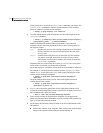
333Administering volume snapshots
Creating instant snapshots
Note: This operation is not possible if the linked volume and snapshot
are in different disk groups.
■ Reattach the snapshot volume with the original volume. See
“Reattaching a linked break-off snapshot volume” on page 339 for
details.
■ Dissociate the snapshot volume entirely from the original volume. This
may be useful if you want to use the copy for other purposes such as
testing or report generation. If desired, you can delete the dissociated
volume. See “Dissociating an instant snapshot” on page 340 for details.
■ If the snapshot is part of a snapshot hierarchy, you can also choose to
split this hierarchy from its parent volumes. See “Splitting an instant
snapshot hierarchy” on page 341 for details.
Creating multiple instant snapshots
To make it easier to create snapshots of several volumes at the same time, the
vxsnap make command accepts multiple tuples that define the source and
snapshot volumes names as their arguments. For example, to create three
instant snapshots, each with the same redundancy, from specified storage, the
following form of the command can be used:
# vxsnap [-g diskgroup] make source=vol1/snapvol=snapvol1\
source=vol2/snapvol=snapvol2 source=vol3/snapvol=snapvol3
The snapshot volumes (snapvol1, snapvol2 and so on) must have been prepared
in advance as described in “Creating a volume for use as a full-sized instant or
linked break-off snapshot” on page 323. The specified source volumes (vol1, vol2
and so on) may be the same volume or they can be different volumes.
If all the snapshots are to be space-optimized and to share the same cache, the
following form of the command can be used:
# vxsnap [-g diskgroup] make \
source=vol1/newvol=snapvol1/cache=cacheobj \
source=vol2/newvol=snapvol2/cache=cacheobj \
source=vol3/newvol=snapvol3/cache=cacheobj \
[alloc=storage_attributes]
The vxsnap make command also allows the snapshots to be of different types,
have different redundancy, and be configured from different storage, as shown
here:
# vxsnap [-g diskgroup] make source=vol1/snapvol=snapvol1 \
source=vol2[/newvol=snapvol2]/cache=cacheobj\
[/alloc=storage_attributes2][/nmirror=number2]
source=vol3[/newvol=snapvol3][/alloc=storage_attributes3]\
/nmirror=number3


















